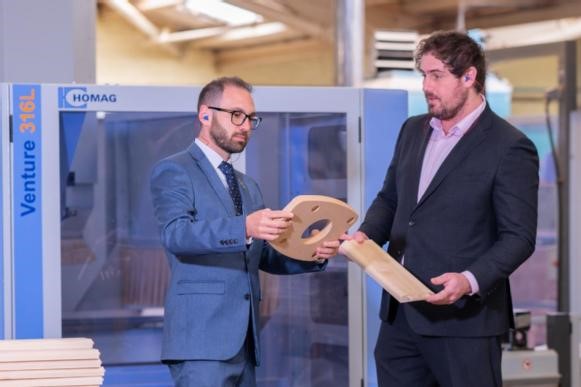Success Story Assetbank
Stainless steel industry develops leaders of the future with WMG
A cohort approach to solving succession challenges in the stainless-steel industry is underway at the British Stainless-Steel Association as WMG sign up to deliver a second leadership programme for members.
Background and Challenge
Manufacturers consistently recognise the critical importance of enhancing leadership and management skills to bridge existing and anticipated skills gaps and to tackle the major challenges facing the industry. The British Stainless Steel Association members are no different and the association has seen a surge in interest from member firms wanting to develop staff to boost growth and innovation.
Adam Bradley, Director of Corrosion Resistant Materials and Vice Chair of the BSSA said:
“Leadership is not something that is taught. What we find at BSSA is that employees that are good at their job and have worked for a long time in a manufacturing firm are generally made leaders. This type of succession activity does not necessarily translate into success, because a distinct set of skills are required to lead, and you must spend time to learn and embed them. Businesses are finding it difficult to help those employees with that transition and are not investing in training because they don’t know where to go.”
Solution
To help their members thrive and move forward, BSSA and WMG worked together to create a leadership programme crafted specifically for the needs of their members. BSSA realised that the membership base would benefit from a taster of what was available in terms of leadership and development training before investing fully. The BSSA Talent Development Programme consists of two modules helping attendees understand their own leadership qualities and behaviours as well as how to lead a team to success. The programme also provides coaching and an opportunity to work on a cohort project to benefit the businesses as well as the association.
The successful pilot that ran earlier this year resulted in the cohort working together on a directory and support materials to help members better understand the food and drink and interiors sectors where stainless steel has enormous potential and application.
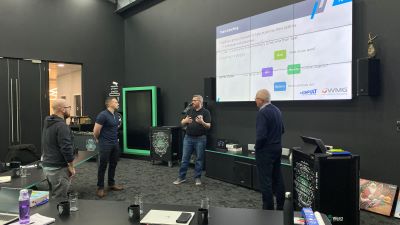
Impacts
As a result of the pilot programme BSSA have committed to offering members the opportunity to join a second Talent Development Programme.
Individuals will benefit from:
- A leadership certificate from the University of Warwick
- Expanding knowledge of products and services within the industry
- The opportunity to network with likeminded individuals
- Additional skills in areas such as presenting, marketing, social media, project management, as well as a boost in confidence
Benefits to the companies involved include:
- The opportunity to promote their brand
- The opportunity to boost their training and development credentials, which will ultimately boost productivity and attract new skills to the sector
James Sweeney, Production Manager at Birmingham based Anopol Group participated in the pilot programme after being promoted to manage a new team. David Cass, Managing Director at the firm said:
“It has been a pleasure observing James’s growth through the BSSA Talent Development Programme. Our team at Anopol are benefitting from his leadership training and networking interaction development. James has clearly grown in confidence and is demonstrating excellent communication skills, attentive process driven approaches to conflicting situations, and mature self-awareness. He thoroughly enjoyed spending time with the programme lecturers and delegates whilst experiencing new business environments. Our next delegate is ready to go!”
Liz McArdle, Innovation Manager at WMG who delivers the programme alongside colleague Steven Norgrove said:
“We are delighted that Adam and the team have decided to invest in this valuable programme for the second time off the back of the successful pilot. WMG is on a mission to equip the leaders of the future with the skills to navigate changes and opportunities in the manufacturing sector. We thoroughly enjoyed collaborating with the participants and seeing them flourish and grow in confidence. We look forward to meeting the next cohort in October.”
Adam Bradley added:
“Our hope is that schemes like this will help to retain and attract talent to the sector which is vitally important for the association and companies across the board. We are excited to witness the journeys that our next set of leaders will go on through the programme.”
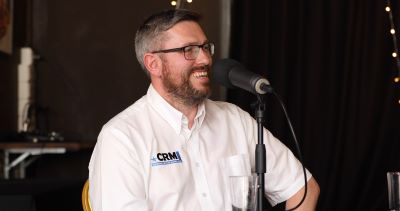
For more information about membership at the BSSA and joining the programme which starts in October visit:
BSSA Talent Development ProgrammeLink opens in a new window
For more information about WMG’s leadership programmes for manufacturing SMEs contact: wmgsme@warwick.ac.uk
A turnover and wellbeing boost at Wrekin Sheetmetal through Made Smarter support
“Working with Made Smarter and having the new system in place has been invaluable for us. It has dramatically improved our production line process and has not only made staff happier but has made it easier for us to onboard new colleagues and products thanks to the system’s ease-of-use.”
Claire Robinson, Managing Director, Wrekin Sheetmetal Ltd
Wrekin SheetmetalLink opens in a new window, based in Telford, manufactures and shapes a wide variety of steel parts and components for a range of sectors, including healthcare, automotive, aerospace, and retail.
Challenge
Although the company were thriving in some areas, there were issues with productivity and data visibility on the shopfloor. They were still printing technical drawings on paper and there were often bottlenecks as one department waited on information from another. The company were not optimised to take on new client products due to a lack of time to develop new processes. This was hindering their ability to grow.
Solution
Managing Director Claire Robinson got in touch with the Made Smarter West Midlands programme, who linked Claire with WMG Engineer, Manikanta Ravi. Mani, with the help of Intern Ravikishore Karuppuswamy, undertook a value stream mapping of Wrekin Sheetmetal’s complete manufacturing process from start to finish, to assess improvement opportunities. He recommended they install a suitable dashboarding solution integrated with current Enterprise Resource Planning (ERP) software MIE Track, using a network of tablets on every machine and in every department to monitor data. Together with WMG’s Denis PelychLink opens in a new window, Made Smarter assisted Wrekin Sheetmetal to access a match-funded grant of £20,000 towards the cost of the new system which reduced the risk associated with the investment.
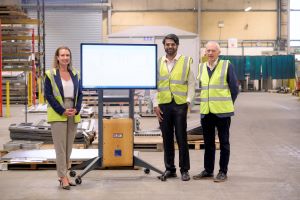
Impacts
- The new system has allowed Wrekin Sheetmetal to devote more time to new product development which will open new growth areas for the business and will help them meet its targets to double turnover by next year
- With the new system in place, Wrekin Sheetmetal are expected to grow capacity by between 10-15% and create seven new jobs
- Wrekin Sheetmetal is now a paperless operation and is using data to drive decision making
- Staff are highly motivated as they now have visibility of their activity, there is reduced time wastage, and they feel bought into the whole manufacturing process. Existing roles will benefit from upskilling going forward
WMG's Manikanta Ravi said:
“Key data such as machine uptime and downtime, technical drawings, and order information is now instantly accessible to every member of the team, with information constantly updated in real time.
The new system has meant the waste identified in our value stream mapping exercise, such as the time taken for the engineering team to pass on drawings to the shop floor team, has been virtually eliminated.”
For the full case study visit:
made-smarter-case-study-wrekin-sheetmetal.pdf (madesmarter.uk)
If you are a manufacturing organisation wanting to work with WMG’s SME team visit:
WMG SME Group Engagement Form (office.com)

Championing the importance of digital in manufacturing, Bridge Cheese picks up two business awards.
Telford based Bridge Cheese has gained two prestigious awards for the way it has harnessed digital technology to grow turnover to £30m in five years. Working with WMG through Made Smarter West Midlands, they have implemented a series of recommendations that have improved efficiency and enabled growth.
Background
Bridge CheeseLink opens in a new window, based in Telford, supplies a variety of cheese and dairy products to the wholesale market, with many of its customers working in the food service industry or food manufacturing. Since its inception in 2018, it has grown rapidly, achieving double-digit growth year-on-year.
Challenge
Bridge Cheese had a mission to double its turnover from £30 million to £60 million in three years. However, to mitigate the pressures of rising costs and to maximise profitability, the two directors Michael Harte and Martin Bowden knew they had to tackle the efficiency of their processes. They were also keen to address issues with stock control and production management.
Michael Harte said:
“We realised that for us to grow further, the analysis of our production processes and costs needed to be a lot better. We had previously relied on spreadsheets and paper records to monitor much of our business’s performance.”
They were aiming to create a smart paperless factory with some automation that would enable them to grow without too much additional labour.

Solution
Telford and Wrekin Council referred the duo to the Made Smarter West Midlands scheme and Made Smarter digital expert Martyn Mangan recommended WMG come in to undertake a thorough audit. This included a “Digital Roadmap” highlighting the steps needed to digitise the business and boost productivity.
WMG's Denis PelychLink opens in a new window worked with Bridge to understand their requirements and what was impeding their growth potential. He suggested a new Enterprise Resource Planning (ERP) system would help improve real time data and visibility to better manage processes. He reviewed various solutions and providers before recommending a specialist food industry package with proven integration to Sage 200, which they were currently using.
The software and services cost was £70k but through Made Smarter, Bridge was able to access a £20k grant. During 2023 using a phased approach, the company implemented the new system which included customised KPI/status dashboards for factory visibility and decision-support.
Impacts
Now up and running, the new system handles everything from tracking orders, stock taking, monitoring machine uptime and downtime, and producing instant quality control reports. Key expected benefits include:
· 20-30% year-on-year growth expected, from £30m to £60m+ revenue in 3 years, including increasing export sales from 2% to 20%+
· 100% reduction in ‘on-time delivery failures’ of orders, plus a saving of the time wasted resolving production issues due to stock issues
· 15-20% improvement in current process efficiency, from process automation across order processing, planning, and production execution
· 10-15% additional efficiency improvement through shop floor digitisation of food safety compliance data capture and management
· 50% reduction in stock days which is around £1.5million of cash freed up to support investment

The outstanding results led to Bridge Cheese being crowned as overall winner of the Made Smarter Adoption Award for the West Midlands region in Birmingham as well as in their own area of the Marches. They represented the West Midlands at the national Made Smarter Awards on 27th June.
Testimonials
“For SMEs like us, support from a scheme like Made Smarter is so important. As part of this journey, Denis’s role became akin to a “non-executive director” advising us in all matters IT related. We are now taking the next steps towards a digital future for our business, and we would encourage others in our position to do the same.”
Michael Harte, Director, Bridge Cheese Ltd
“Bridge Cheese were a delight to work with and are highly motivated to build on their already excellent reputation for service quality. The new system will enable them to achieve their growth ambition without any risk to delivering on client expectations. There are many additional areas that they can focus on with digital going forward such as further automation which is very exciting.”
Denis Pelych, Digital Manufacturing Advisor, WMG, University of Warwick
To find out more about working with WMG on digitising your business contact WMG's SME TeamLink opens in a new window
For further information on Bridge Cheese visit: Welcome to our World of Cheese - Bridge CheeseLink opens in a new window
To read the full story and watch the video about Bridge Cheese’s journey on Made Smarter visit: Case Study - Bridge Cheese | Made SmarterLink opens in a new window

Machine learning project automates complex tooling job at Expert Technologies Group
A two-year Knowledge Transfer Partnership (KTP) between WMG, University of Warwick and expert industrial automation specialist Expert Technologies GroupLink opens in a new window has introduced machine learning into a range of engineering settings that were previously thought too complex to implement. KTP Associate Mateusz Ogrodnik reduced the time of designing new mechanical fixture plans* from weeks to minutes.
Challenge
Historically the job of creating mechanical fixture plans was deemed too complex to automate. Despite involving repetitive tasks, the processes were too nuanced for simple automations to handle, and tooling designers were still an essential component.
However Expert Technologies were keen to devise and implement a novel approach to this unsolved problem, so that designers’ time could be better utilised on higher value, strategic tasks in the business.
The key challenge was the sheer computational complexity of this process. A typical fixture plan has around 40 elements which would mean that around 250 parameters had to be implemented into an automated solution.
As part of this project, Expert wanted to create and embed a systematic approach to solving complex engineering problems for the future. With the use of machine learning on an upward curve, this project would pave the way for them to continue to use this kind of technology for other hugely complex problems.
Solution
With the support of WMG, they opted to apply for an Innovate UK funded Knowledge Transfer Partnership (KTP). KTPs link forward thinking businesses with a knowledge base to deliver on an innovative project led by inspired graduates.
Initially, Knowledge Transfer Associate (KTA), Cesar Reyes, was appointed. His work laid strong foundations and a year later, a second KTA, Mateusz Ogrodnik joined the team. His approach, thanks to experience in optimisation and software development, along with support from WMG's Professor Pasquale FranciosaLink opens in a new window, led to the development of a completely novel set of algorithms that reduced the computational complexity.
Mateusz arranged meetings with senior engineers at Expert to understand how an experienced designer would approach the problem which helped to speed up the time it took for the automated system to create a design. This was followed by building a prototype app, where multiple case studies could automatically be tested. As the number of bespoke algorithms grew, and time left to create a solution decreased, Mateusz spent time working directly with the engineers to undertake further beta testing to arrive at the final prototypes. Mateusz also attended the Association for the Advancement of Artificial Intelligence conference in Canada, where he was able to gather further insights for this project as well as other opportunities to take forward at Expert.
Impacts
· A final prototype tool was created which reduced the time of developing mechanical fixture plans from weeks to hours which will lead to significant cost savings for the business.
· Mateusz has been hired by Expert as a Senior Software Development Engineer.
· Expert has put new software development approaches into practice which will de-risk other software-based projects.
· The project opened up a number of ideas for other Expert employees to build, develop and share within the company.
· New software projects, including complex machine learning tasks have been brought forward and de-risked thanks to this project.
· Expert has now applied for a further Accelerated Knowledge Transfer grant to work on a similar project.
Ian Snape, Engineering Director at Expert Technologies Group said:
“To witness the ground-breaking final prototype demonstration was a realisation of an unrealistic idea four years ago. Not accepting the ‘norm’ and embracing development failure as an opportunity to dissect and optimise, is the heartbeat of this achievement. We celebrate the powerful new fusion of engineering and data science within this Expert / WMG collaboration and look forward to the next set of limitations we rip up.”
WMG Reader and academic supervisor on this project Pasquale Franciosa said:
“The work with Expert Technologies Group through the Knowledge Transfer Partnership root is great evidence of transferring academic research outputs into industrial operation. The project nicely bridged engineering design with digital technologies and proved that this is the way forward to support business growth, whilst releasing capacity and maximising productivity.”
For more information on working with WMG on KTP projects contact wmgsme@warwick.ac.uk
For more information on Expert Technologies Group visit:
Expert Technologies Group | Industrial Automation Technology
*A fixture is a device for locating, holding and supporting a workpiece during a manufacturing operation. Fixtures are essential elements of production processes as they are required in most automated manufacturing, inspection, and assembly operations.
A sustainable edge leads to transformative changes at Alpha Anodising
“The work undertaken in this project has so far exceeded our expectations, we are looking forward to getting the new system up and running in the business and continuing our productivity push through sustainability measures.”
Leslie Sharp, Managing Director, Alpha Anodising Ltd
Background
Alpha Anodising was formed in 1972 to fulfil a requirement for quality black anodising of equipment for the motion picture industry. Anodising is an electrochemical process that develops an aluminium oxide coat on the surface of a part or product. This protects the product from wear and tear as well as enhancing the overall look.
Challenge and Drivers
Alpha Anodising were on a mission to develop their sustainability credentials and reduce the costs of running their energy intensive shop floor, which houses a swathe of large bubbling tanks preparing anodising treatments ready for products including high end consumer electronics, and industrial process equipment.
Another key driver was that more and more of their clients were requesting information about their Environmental, Sustainability and Governance (ESG) targets.
To get an edge in this area, they wanted to energy monitor key equipment including three electrically powered 240V heaters heating a 1 1000L boil tank used during the anodisation process, which were responsible for 37% of the entire site’s energy consumption.
They also wished to improve the current method of managing their equipment across the factory more generally. In the current state, employees were coming in early to manually turn on heaters to get the boil tanks up to temperature ready for production. This was not ideal when arranging weekend or shift work and when the clocks changed, as it involved having to manually reprogram heater timers on up to 50 tanks.
Solution
Tap into a network and get to grips with baseline data
The company joined WMG’s Net Zero Innovation Network and were one of the first companies to benefit from a tailored manufacturing energy toolkit to better understand energy hotpots in the business.
We measured the electrical energy consumption over a six-week period, looking at the consumption of energy, the cost and carbon equivalencies, as well as testing some insulative lids to compare energy consumption before and after. As a result, a full report with a range of energy saving recommendations was presented including heater upgrades, timers, and the introduction of a dashboard to increase visibility of energy usage in the factory.
Access funding to make a difference
Following this initial project, Alpha secured a grant through the Innovate UK Business Growth programme to develop a solution that would network, centralise and simplify the process of managing the temperature of the boil tanks in the business in order to increase efficiencies and optimise energy usage.
WMG’s Julian Swiestowski, identified that there was an opportunity to use IoT (Internet of Things) technology and connectivity to make this happen.
Julian explored a range of off the shelf solutions for Alpha, that were competitively priced, easily programmable, and possible to retrofit beyond this project to other equipment. He settled on some factory automation software from the Siemens logo series. It provides a compact controller that links directly to the cloud so that the company can set and adjust the temperature for the tanks away from the shop floor, in the office or on tablets and mobile devices at home.
With this solution there is now the opportunity to monitor data over time to understand energy usage, system performance, and productivity and make changes accordingly. The tanks would also be set with thermostats.
Impacts
Whilst initially Alpha Anodising started work with WMG to enhance its ESG activity, the collaboration and IoT project will lead to a number of transformational benefits:
· The new IoT system will save Alpha thousands of pounds a year in energy costs through automation and better insight into usage;
· The new system will allow for higher levels of productivity in the business and enhanced quality as there will now be a whole range of data that can be used to tweak production parameters;
· The system will free up staff to work on other activities which will increase efficiencies and there will also be opportunities for the upskilling of staff to use the new digital systems;
· There are now a range of sustainability-led ideas developing within the firm such as insulation on tanks and the introduction of a two-stage counter current rinse system to reduce water consumption by 40-50% They have also invested significantly in Solar Energy Panels and new equipment such as a top of the range Timesaver linishing machine and additional bead blasting cabinets. Link opens in a new window
Link opens in a new window
For more information on working with WMG's SME group contact wmgsme@warwick.ac.uk
For more information on Alpha Anodising visit: https://www.alphaanodising.co.uk

Flexing their operational muscles – Goodflex Rubber Ltd set to expand with new ERP system
“Our involvement with the Made Smarter programme gave us the confidence to move forward with one of biggest changes to the company in its 22-year history. This investment will not only allow us to improve our efficiencies but also provide us with the security to continue to grow in the future, aiding us to deliver even better products and services to our customers and ensure we remain a leader in the industry.”
Natalie Benwell, Commercial Manager, Goodflex Rubber Ltd
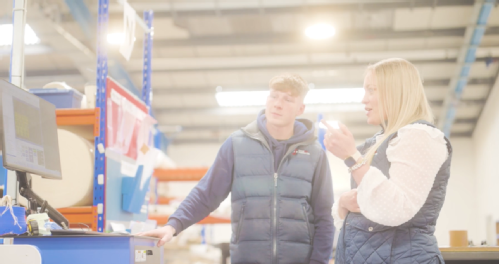
Warwickshire based Goodflex Rubber Ltd are world renowned manufacturers of high quality, bespoke-design silicone hoses, serving a range of industries including automotive, pharmaceutical, renewable energy, and food.
Challenge
Goodflex had plans to double their turnover over the next three years but were concerned that their Factory Management System was holding them back from achieving this growth. They had been using their current bespoke ERP system since the business was started and it had evolved over time to be used for multiple areas within the business, including material resource planning, accounts, stock management, work order management, invoicing, and delivery notes.
But they needed to move to software which would enable their day-to-day operations to be more efficient, allow them to respond more quickly to their customers and futureproof their processes.
Solution
Commercial manager Natalie Benwell got in touch with the Made Smarter West Midlands programme and was introduced to WMG’s Denis Pelych who quickly set about understanding the company’s specific requirements. It was clear that Goodflex needed an enhanced, futureproof, digital system to drive efficiencies and maintain control of some of their more complex product builds, but they were unsure what specific system to invest in.
Denis conducted a two-stage MRP and ERP* vendor selection process, with Made Smarter support and helped Goodflex select an ERP system that offered the capability they needed today, with a degree of futureproofing. The investment required was approximately £100k but Goodflex were able to access £20k with the help of a Made Smarter grant.
Natalie said:
“Denis understood and identified our needs better than we understood them ourselves and then successfully translated them into an RFP (Request for Proposal) that was such a true reflection of our business. His knowledge in the industry, not only opened our eyes to what was possible, but also took us down a route we never knew existed.”
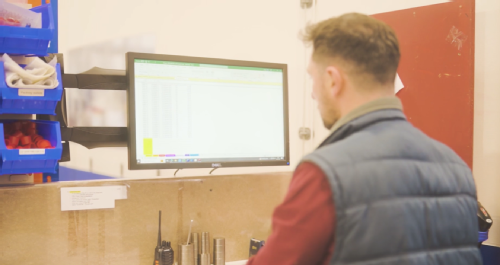
Impacts
- The new system will help Goodflex increase the speed of response to their customers
- The new system will help Goodflex double their revenue to £10m in three years, with the potential to reach £15-20m in five years, whilst maintaining margins and investment
- The system will lead to a 20-30% efficiency improvement from the automation of business processes
- The company expect to see a 15-20% improvement in material supply and stock efficiencies
- Efficiencies gained through the system will lead to higher levels of profitability
- The new system provides better management information with the ability to set KPIs and have greater operational insight in order to make data driven business decisions
- The new system will also improve Goodflex’s business development strategy enabled by greater insight into costs and opportunities
- The new system has improved workplace motivation and will help to retain and develop highly skilled staff
*ERP vs MRP: What’s The Difference? – Forbes Advisor
Read the full story on the Made Smarter website here.Link opens in a new window
Heating up for expansion with Eskimo Products
“WMG have been great to work with, they digested the brief, stuck to it, and delivered a great factory optimisation project. I was really impressed with the level of detail within the report and really enjoyed working alongside their engineers.”
Phil Ward, Managing Director, Eskimo Products Ltd
Background
Luxury radiator and towel rail design firm, Eskimo ProductsLink opens in a new window designs and manufactures a range of top end products with a focus on creating beautiful aesthetics within homes as well as being highly energy efficient. With a design office in Bristol and manufacturing space in Birmingham close to the international airport, the firm were setting their sights on growth and expansion.
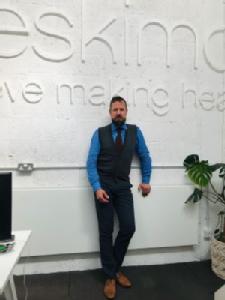
Challenge
The company had plans to move into a new factory in 2025 to scale up production following an increase in demand. They were looking for support to maximise the productivity potential of the layout in the new space and in the existing facility. They also needed support to digitise their manufacturing process.
Solution
Phil Ward, founder of the firm worked with WMG SME group’s Manikanta Ravi and Gun Gokmen to set up a project using Innovate UK Business GrowthLink opens in a new window (previously Innovate UK EDGE) funding with objectives to:
- Measure the current state of the factory to understand what was inhibiting target productivity
- Recommend improvements to increase capacity and reduce wastes on two key product lines (Column and Gordon) using lean methods and automation
The project would allow for a seamless transition and the opportunity to scope any new investments and potential changes before the move - essentially minimising any risks and to avoid any downtime.
Mani and Gun compared current capacity against the required capacity to meet the forecasted demand and identified that there was a shortfall. They performed bottleneck analysis for the overall process flow from customer order to raw materials, and manufacturing to customer delivery.
The extensive study allowed them to identify bottlenecks and areas for lean improvement, as well as make recommendations for where capacity could be enhanced such as an additional spindle tool to reduce CNC Machine setup time, standardising the setup of the powder coating process, improving lighting to reduce the number of re-works, introducing a new cell for assembling, testing and packing, adopting 5S workplace organisation methods and more advanced techniques such as automated welding with a suggested cycle time to meet demand. They recommended a phased approach for improving different areas overall, including welding, machining, and treatment.

Impacts
- Once implemented, WMG’s recommendations will reduce current bottleneck times by 72% per product on the Column product line and 43% on the Gordon line. So, for every 100 units made, 33 hours can be saved on the Column product line and 20 hours on the Gordon;
- As a result of the project, with the addition of robot welding and a pre-treatment plant, production capacity for the Column line will increase by 360% and for the Gordon line 37%;
- The improvements suggested will lead to estimated additional turnover of up to £365k per year;
- The company is now in a more informed position to make the move to the new space with automation and factory layout proposals that will help them meet capacity and grow the business.
Eskimo are currently working with other WMG colleagues through the Made Smarter West Midlands programme to implement the robotic welding process and will benefit from a grant to make this a reality. They are also embarking on a new WMG project for advice on the best manufacturing techniques and layout to take a new thermal energy storage product to market.

“It was great to work with the team at Eskimo to help them realise some of their growth ambitions through an improved factory layout. With the added digital capabilities proposed through Made Smarter West Midlands, there are even more opportunities for expansion. Innovate UK's Edge programme (Innovate UK Business Growth) helps businesses connect with the right expertise at whatever stage of growth they are at. We are excited to see where Eskimo goes next.”
Engineer Manikanta RaviLink opens in a new window and Industrial Engineer Gun GokmenLink opens in a new window, WMG University of Warwick
Armac Martin reignite sustainability drive with second collaborative project
“Working with WMG again has been really beneficial for us. This project will enable us to lower our carbon emissions, something critical for us from both a CSR perspective and in combating rising energy costs to remain competitive.”
Steven West, Head of Operations, Armac Martin Ltd
Background
In 2021, following the introduction of the UK Government’s Net Zero strategy, luxury brass hardware manufacturer, Armac Martin was one of the first companies to join WMG’s Net Zero Innovation (NZIN) Progamme. They collaborated with us to implement sustainable packaging for key product lines in their business. After exploring recyclable, compostable, and returnable options, a cost effective and biodegradable paper-based material was selected which reduced packing time significantly, leading to productivity gains in the business.
Challenge
With renewed drive to reduce emissions by 50% by 2025 and reach Net Zero by 2041, Armac Martin wanted to work with WMG again to see where they could best focus their attentions to achieve these goals. They joined the NZIN programme on a second cohort alongside Brandauer, Sarginsons, Modpods and McGeoch.
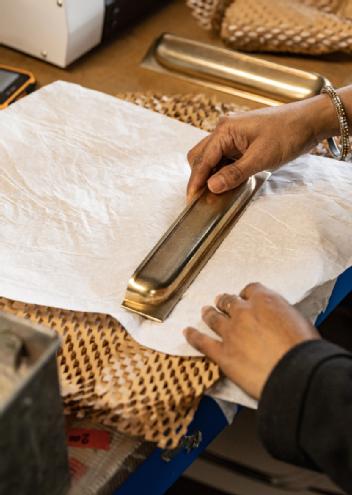
Solution
WMG examined how the company could reduce emissions across Scope 1,2 and 3[i] in the business, through a Greenhouse Gas Accounting project. We highlighted a range of opportunities for them to take onboard as part of a five-year roadmap for sustainable change aligned with business visions and priorities through a NZIN roadmap. Representatives from the company also participated in several workshops hosted by WMG.
Impacts
· The company now have a clear vision of how they are going to reach their 2025 and 2041 targets with an action plan to reduce energy costs in the business, including using data to optimise energy usage, as well as voltage optimisation, insulation, and variable speed drives of machinery,
· They plan to install Solar PV Panels to reduce energy related emissions and susceptibility to grid price fluctuations
· They have the opportunity to access grant funding to install the Solar Panels of up to £100,000,
· They now have a robust sustainability strategy which they communicate to both internal and external stakeholders.
“Armac Martin are a company committed to sustainability and it was great to work with them on a second project looking at energy usage in the business. They are a shining example of how businesses can work towards Net Zero targets while adding value to their clients’ customer experience.”
Archit Tamboli, Technology Transfer Engineer, WMG, University of Warwick
For more info on Armac Martin’s sustainability strategy visit:
https://www.armacmartin.co.uk/
[i] *Scope 1 emissions are the Green House Gas (GHG) emissions that a company makes directly — for example while running its boilers and vehicles.
Scope 2 emissions are the emissions it makes indirectly – like the electricity or energy it buys for heating and cooling buildings, which is being produced on its behalf.
Scope 3 emissions are all the emissions associated, not with the company itself, but those that the organisation is indirectly responsible for, up and down its value chain. For example, from buying products from its suppliers, and from its products when customers use them.
Reaping the rewards of collaboration – further impact for Jaltek Systems as partnership with WMG goes from strength to strength.
Automation project leads to productivity gains and new opportunities to upskill valuable teams.
Background
Founded in 1988, Jaltek Systems are a contract electronics manufacturer with full electronics design capability. They first worked with WMG in 2022 when we helped them with an expansion and new factory layout for new premises. Two years later, having landed new business worth almost £3 million and taken on Nayan the intern that helped them implement production line changes, they contacted WMG again for support with automation.
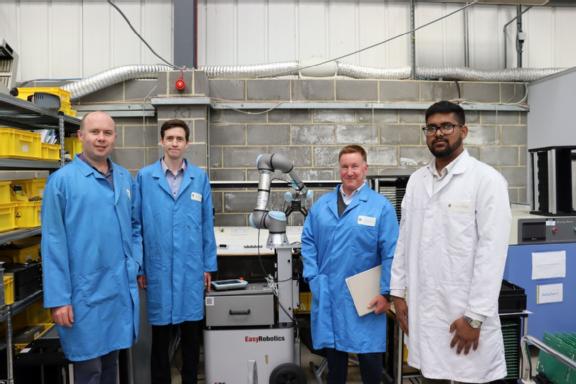
Challenge
Jaltek has grown significantly in recent years with further ambitious plans, and they were looking to adopt digital technology, particularly in robotics and automation to facilitate this growth. Steve Blythe, at Jaltek had visited the Advanced Metal Research Centre in Wales and other SME businesses who had started using collaborative robots (cobots) and had identified that automation could:
· Provide productivity enhancement with the need to recruit less
· Offer extended working hours – machines could operate outside regular working hours
· Help with issues such as the UK’s restrictions on labour movement, which were making it difficult to find new employees with the right skills
· Provide the opportunity for skilled employees to do more interesting, higher value tasks
Already using machines for the surface mount placement process, Steve identified that cobots could also be implemented for post surface mount assembly activity and labelling.
Solution
Following the success of previous WMG internships at Jaltek, they decided that taking on another intern would help them direct the resource needed on this project while saving valuable management time. With WMG supervision, intern Kesava Viknesh was appointed. He initially undertook an automation feasibility study for the complete set of processes in the business, quantifying the benefits of automation for each one. He then conducted a comparison study of different automation solutions, resulting in a list of the top three opportunities. After creating and presenting the business case to the board of directors, Kesava then went on to create a simulation of the automated labelling process to de-risk the investment. Jaltek also benefitted from a pilot trial of automation to assemble one of their products using WMG’s UR5e cobot before investing in their first cobot.
Impact
The internship project led to a range of impacts including:
· Identifying significant productivity improvements;
· A new full-time position for Kesava as an automation engineer;
· The upskilling of existing staff to fulfil higher value skilled jobs now that the cobots can undertake other tasks;
· A change in proposition for new employees, with a focus on highlighting the business’s values;
· Improved precision and uniformity which in turn supports the sustainability credentials for Jaltek as there is less waste;
· The opportunity for extended operations (as robots can work outside regular working hours);
· The ability for Jaltek to keep pace with technological advancements;
· An additional Accelerated Knowledge Transfer (AKT) grant to enable another young engineer to join the firm on a 16-week project to continue with the integration of robotics technology into their processes.
Steve Blythe, at Jaltek Systems said:
“We are continually looking to improve productivity through training, improved processes, and automation. We saw good practice using cobots in other businesses and reached out to WMG to support our plans. We are very happy with the results of the second internship, and we are only at the beginning of this journey.”
Jack Davis, Technology Transfer Engineer at WMG who supervised Kesava said:
“This internship project enabled Jaltek to trial the use of cobots on one of their key processes before taking the plunge to invest themselves, reducing risk and ensuring that they got the exact technological solution for their requirements. Kesava did a fantastic job, so much so that he has now secured a position with Jaltek.”
WMG supports Goodfish on its sustainability journey
Goodfish Group have benefited from WMG’s Net Zero Innovation Network with a tailored project focused on helping them achieve their Net Zero goals.
Background
Goodfish Group is the UK’s leading privately-owned contract manufacturer of plastic and composite components. Its expertise in injection-moulding, extrusion, vacuum-forming, and tooling has been developed through successive acquisitions of leading companies in each discipline.
The group has partnered with WMG at the University of Warwick over the last ten years to work on new product and process development and most recently were one of the first companies to benefit from a new Net Zero Innovation Network which was set up to support SME manufacturers achieve their Net Zero goals.
Challenge
Goodfish were keen to map their current waste streams to identify opportunities where they could reduce emissions and increase their environmental, financial, and social sustainability. They recognised that the St Asaph site was the least mature in terms of sustainability, therefore asked the WMG team to focus on this site initially.
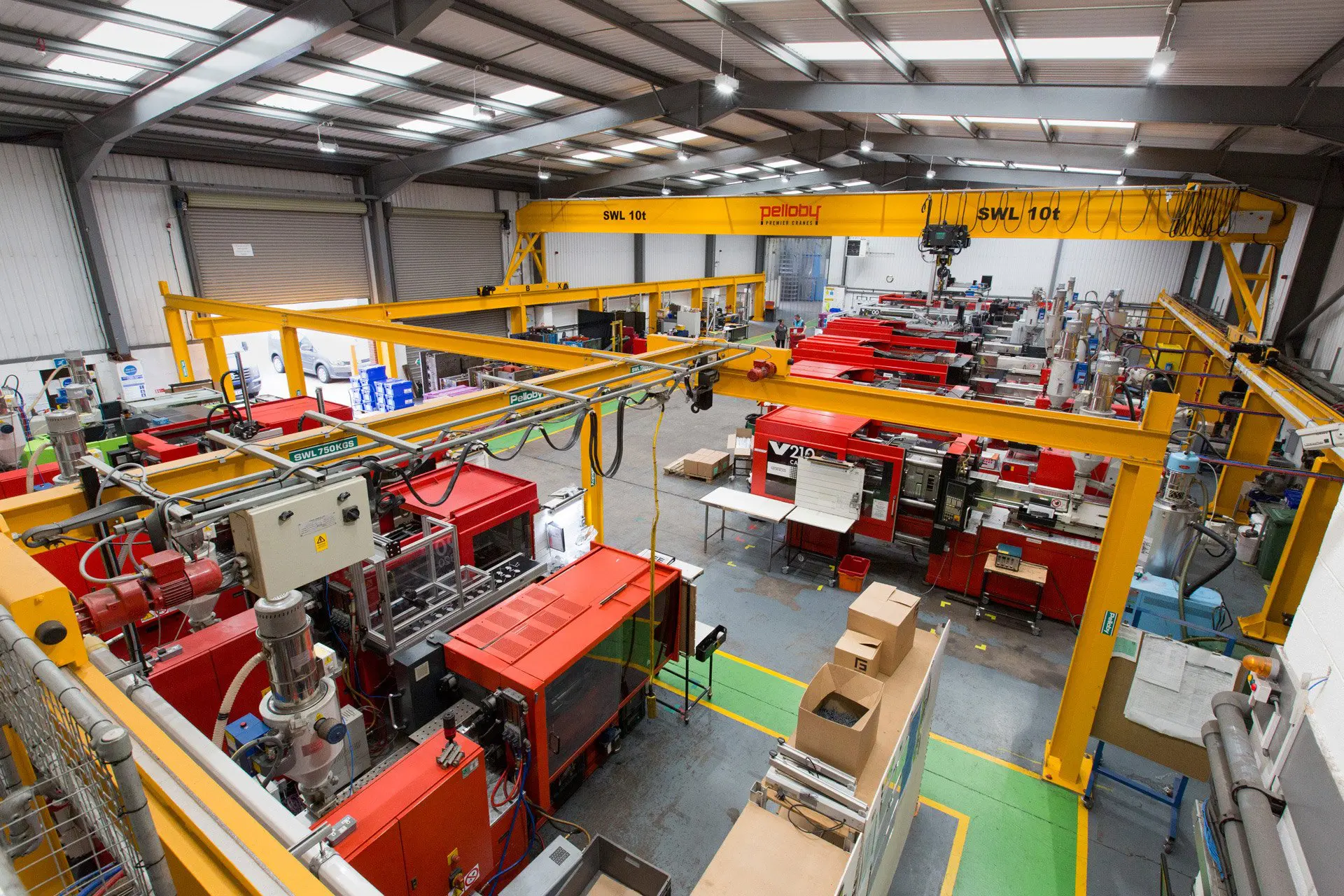
Solution
WMG undertook a Factory walk at St Asaph to identify the waste streams on site in terms of internal waste generation (extrusion and injection moulding) as well as external. They examined waste across Scope 1, 2 and 3 emissions*. Recommendations were then made via the 5R model which helps companies see where they can reduce waste, recycle, reuse, recover or ultimately refuse or prevent the waste happening in the first place.
Goodfish were advised to start making cultural changes within the organisation to encourage better monitoring of wasteful practices and to understand which machines were most energy intensive. WMG suggested using reusable packaging, finding more local recycling facilities, and reusing waste material for new products. They also suggested implementing thermal insulation jackets on injection moulding machines which on a 500T clamp force machine for example could offer a 13% energy saving over a 13-hour shift.
Impact
- Since joining the WMG cohort, Goodfish have taken significant strides forward with their waste reduction activities.
- They have invested approximately £70k in monitoring equipment to enable visibility of energy usage of all machinery across all three sites. With such granularity, they can make changes and updates to machines for optimal energy usage.
- They implemented the insulation jackets on 70 injection moulding machines which has saved 20% on monthly energy consumption
- They are now able to attribute the carbon footprint or CO2 equivalent for each product/part made, which has boosted their sustainability credentials with their clients
- They are now implementing total preventative maintenance and staff training programmes across the group to make even more savings
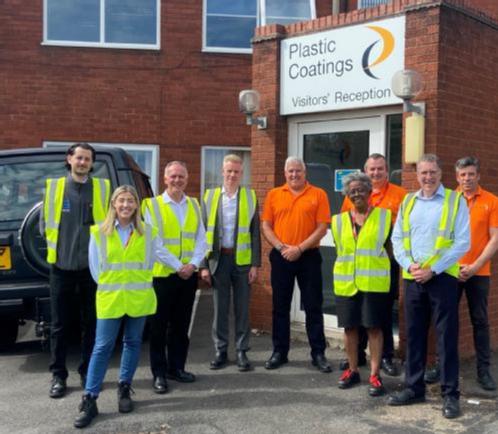
Guy McDonald, Director and Business Transformation Manager at Goodfish said:
“The NZIN programme was useful to meet other business leaders on similar journeys and to understand the Net Zero requirements from an OEM’s perspective, in this case Polestar.
At Goodfish, data is the bedrock of all that do we in terms of energy efficiency. We pretty much know where all the energy hotspots are in the business now and can therefore make targeted changes to boost our Net Zero credentials going forward.”
WMG’s Net Zero Approach
WMG’s Net Zero Innovation programme brings businesses together to gain knowledge about sustainable manufacturing processes, implement change and grow. As well as offering events, workshops, and a best practice visit to a company already implementing sustainable approaches, participating companies also benefit from a tailored project, Net Zero assessment and roadmap report.
For more information about joining a cohort email: wmgsme@warwick.ac.uk
*Scope 1 emissions are the Green House Gas (GHG) emissions that a company makes directly — for example while running its boilers and vehicles.
Scope 2 emissions are the emissions it makes indirectly – like the electricity or energy it buys for heating and cooling buildings, which is being produced on its behalf.
Scope 3 emissions are all the emissions associated, not with the company itself, but those that the organisation is indirectly responsible for, up and down its value chain. For example, from buying products from its suppliers, and from its products when customers use them.
MyWorkwear - Looking good for the future
“In the last couple of months, we have almost doubled our output compared to 18-24 months ago and we can all see the benefits of the new system compared to our old processes. Our turnaround time has been reduced significantly and there are fewer mistakes to be corrected which is another bonus.”
Ben Simpson, Co-Managing Director, MyWorkwearLink opens in a new window
Challenge
Under the leadership of Managing Directors Ben Simpson and James Worthington, MyWorkwearLink opens in a new window, which was started in 1976, produces thousands of garments every week for companies large and small across the UK. Using state-of-the-art embroidery and print machines, the company adds logos, names and designs onto uniforms, workwear, teamwear, promotional items and other garments. The business also supplies PPE and non-personalised clothing from its 6,500 sq ft premises to its customers predominantly in the Midlands and nationwide.
MyWorkwear was growing rapidly and needed its internal systems to reflect the upsurge in orders.
Ben Simpson, Co-Managing Director, said: “Our systems were starting to struggle because we still had processes in place from a long time ago.”
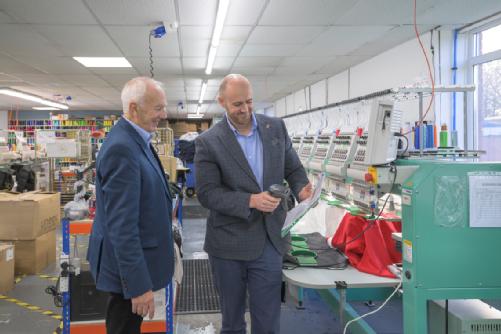
Solution
Working with partners at Made Smarter West Midlands, colleagues at WMG undertook a digital roadmap which led MyWorkwear to buy a specialist ERP system and software that involves the embroidery machines – which embroider many garments simultaneously – ‘talking’ to a central piece of software. It also enables staff to complete the colourisation and bar code scanning on the garments.
“The comprehensive digital roadmap that we carried out for the business highlighted areas which we felt would improve their productivity. We are delighted to have played a part in improving the digitalisation of MyWorkwear which is already leading to efficiencies, and they are a great example for other West Midlands businesses to follow.”
Onur Eren, Chief Engineer, WMGLink opens in a new window
Impact
Read more here about the project and the results here.Link opens in a new window
For more information about working with WMG's SME Group email wmgsme@warwick.ac.uk

WMG Accelerator Programme helps Birmingham business bring authentic Oriental and Asian food manufacturing to the UK
Background
Top Oriental is a niche-food manufacturer based in Birmingham that produces Oriental and Asian food products for the UK and European markets. They have a large facility in Coventry containing semi-automated food production lines. Given that the majority of Oriental and Asian food products have historically been imported into the UK with little customisation to UK consumers, Top Oriental saw an opportunity to re-shore manufacturing capability in this area back to the UK and make market-leading products designed with customer requirements in mind.
Challenge
WMG has a longstanding relationship with Top Oriental. Previous to joining WMG Accelerator, WMG Professors in Innovation & Entrepreneurship, Prof. Jay Bal and Prof. Xiao Ma advised the transformation of the business from a ‘manufacturer to wholesale’ model to ‘direct to customer’ model. Top Oriental were keen to improve their production capability and strengthen the commercial side of the business.
Finding out how the WMG Accelerator team could help tackle these challenges, Top Oriental wanted to grow their revenue and permanently move to a ‘direct to customer’ (D2C) business model in order to achieve their objectives.
As part of the preparation for entering the Accelerator, the team diagnosed a number of issues in Top Oriental’s production and commercial operations. In particular, there was reduced visibility across the stock management process and some production processes were avoidably manual. On the commercial side, there was no room for new product development, piloting was limited and there was limited resource to develop new sales channels and market research.
Top Oriental needed resource fast, and the knowledge and best practice to progress. To provide the best solutions, Top Oriental joined the WMG Accelerator Programme to help them overcome their challenges.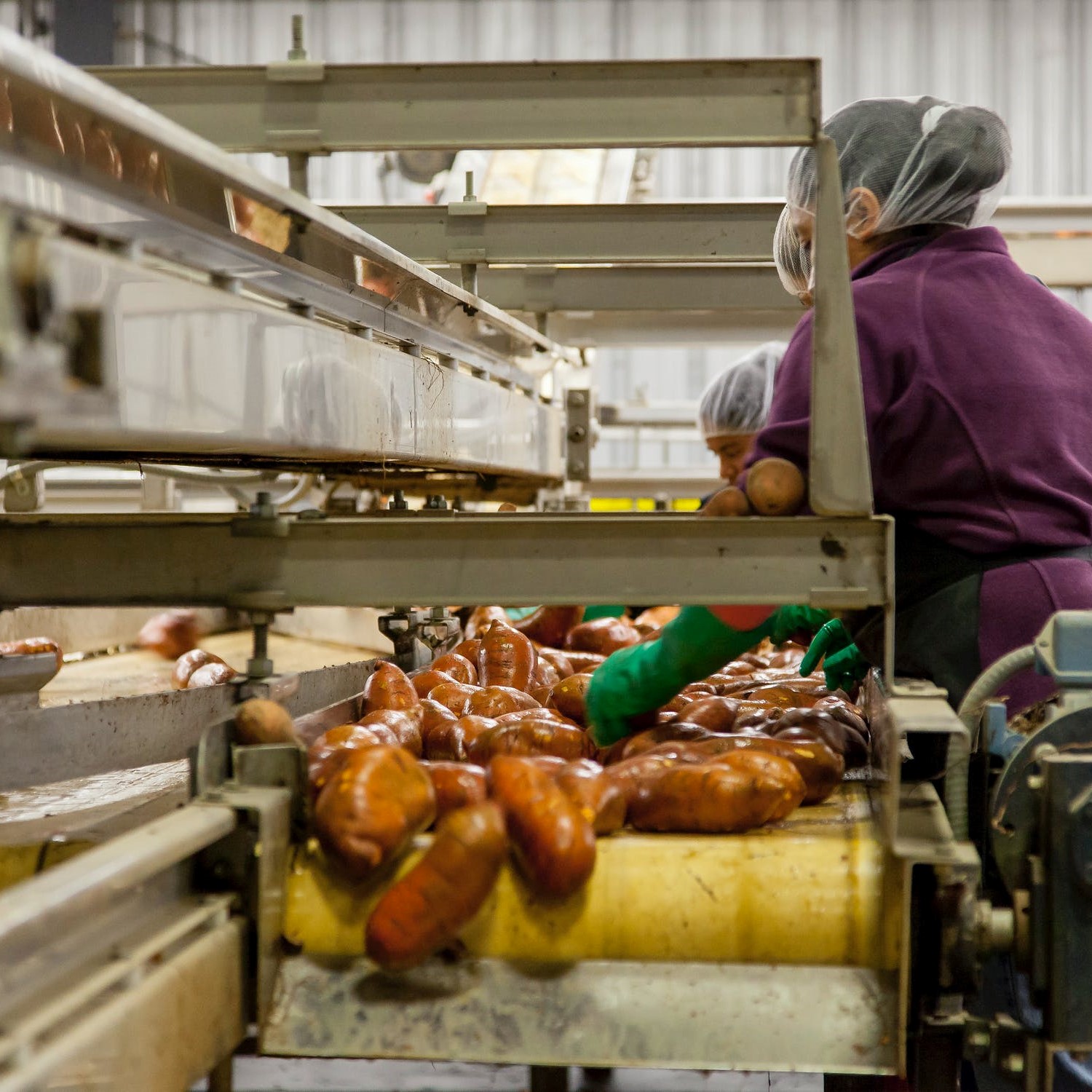
Solution
Working in collaboration with WMG, Top Oriental were able to:
§ Identify gaps in between product development and customer taste profiles using quantitative social listening and qualitative customer research.
§ Gain the skills and knowledge of “lean start-up” methods in order to accelerate their product development cycles, so they could go from gathering market intelligence to real product testing and new product launches in shorter time frame.
§ Created new products based off identified market requirements, most notably a tofu-based snack given the growing demand for alternatives to poultry and red meat in the UK market.
§ Mapped their existing large production facility and created the first production “digital twin” to identify and diagnose bottlenecks and wastage points, in preparation for the rapid responsive reconfiguration of facilities to cater new product development.
§ Assessed a range of lightweight enterprise resource planning (ERP) systems for manufacturing SMEs, and recommended a “best fit” solution to cater a lean start-up model of the rapid responsive reconfiguration of facilities. ERP software systems help organisations manage critical business operations, aligning and creating visibility across all key functions of the operation, including procurement, project management, risk management, compliance and supply-chain.
Impact
As a result of this collaboration, Top Oriental has successfully adopted a “lean start-up” model for its production from market validation to manufacturing and has managed to iterate on its production line and corresponding manufacturing reconfiguration on a quarterly basis. This core enabling ability has led to:
§ Launch of three new product groups, now widely distributed across the UK
§ Increased sales by 30%
§ Re-shoring niche food production back to the UK, given that many of its products were previously imported from the EU.
§ An increased order from the EU, though Brexit still hinders the actual export process. Top Oriental has an estimated £50k per month export value, under the assumption of a smooth export process to EU.
§ Implementation of the ERP system recommended and co-validated with the WMG Accelerator team
§ WMG assisted Top Oriental in securing a new Chief Operating Officer (COO) – who is now executing the newly defined strategy
§ The COO and the WMG Accelerator team are now exploring further project opportunities to ensure Top Oriental continue its innovation in both growing into niche markets, and manufacturing capability advancement.
Ming, CEO at Top Oriental, commented: “It is difficult for businesses to consider disruptive innovations when you’ve been working one way for so long. WMG Accelerator supported us in finding and materialising our new competitive advantages and rapidly responding to a new niche through dynamic reconfiguration of production ability.”
Xiao Ma, Project Lead at WMG, added, “WMG Accelerator team is trying to bring industry transformation to life. We help innovative businesses, such as Top Oriental, to adopt proven methodologies to challenge the current status quo in its industry. It is exciting to see a disruptor has pivoted from “playing” the existing game in its industry, to instead becoming a “game master” by creating new innovations and routes to market for its industry sector.”
For more information about joining the WMG Accelerator Programme, please email us on wmgsme@warwick.ac.uk
Woodwork company nails success with more than £70k yearly savings with WMG
Background
Gordon Ellis & Co is a UK manufacturer of precision woodworking and rotational moulding. With more than 150 years of experience, the company has moved from horse and hand tools to today’s CNC precision woodworking machinery. Products include hospital bed frames, commodes, trolleys, high end audio equipment casings, and automotive wooden internal components. Their rota moulding products have a wide range of durable and weather resistant applications.
Challenge
Gordon Ellis & Co has been making quality wooden and rotational moulded products for many years. Although they’ve progressed massively from manual manufacturing practices to industrial machinery, they are now interested in stepping into the digital age.
Having met the WMG SME Group at a networking event, they were interested in getting their perspective for moving forward and building better. This would mean investigating a way of analysing the factory to discover how ‘digital manufacturing’ can create improvements. They hoped this would help them to make more products faster to meet their increasing customer demand.
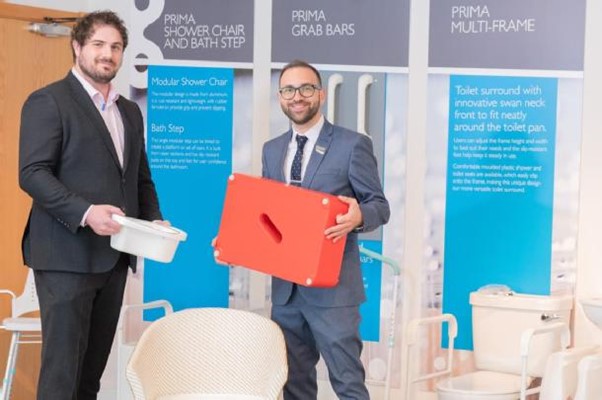
Solution
Digital manufacturing is often a thrown around buzz-phrase, but at WMG we aim to promote and explain just how much digital manufacturing can improve efficiency, productivity, and data collection. First things first, we wanted to make sure Gordon Ellis’s factory was prepared for the transition.
Rich Savidge, Technology Transfer Engineer at WMG, and Onur Eren, Innovation Manager, undertook a detailed investigation of the key facilities ‘current-state’, reviewing existing equipment, productivity, efficiency, and data outputs. Working with Gordon Ellis & Co, the team were able to propose a ‘future-state’, recognising equipment suitable for upgrade, targeting challenge areas and developing the businesses core capabilities.
The core impacts of the project saw reduced costs by eliminating material waste and promoting operational excellence methodologies. The team also recognised ways to introduce useful methods to gather data from their factory.
During this preliminary optimisation project, it was clear that digitisation would have a major improvement to Gordon Ellis & Co’s turnover while increasing their capability to stay competitive and enter luxury markets. The team worked hard to submit a Knowledge Transfer Partnership (KTP) bid that will gain them the funding they’d need to complete a two-year project to source an associate engineer to implement sensors and data collection devices around the factory. The beauty of a KTP is that it works in partnership with the externally employed graduate (the associate), and WMG utilising the facilities, expertise, and resources to see the project through to the end.
Impact
- The preliminary project ‘quick-wins’ saved the company £70k a year through waste elimination and the streamlining of internal procedures.
- More substantial gains will be had after the installation of state-of-the-art CNC equipment yielding an estimated gain in production capacity of x 4, de-risked by the team’s involvement.
- The Innovate UK KTP bid funding was successful and the project aims to increase the turnover of Gordon Ellis & Co by £540k over the next five years.
- Their savings will allow them to invest in the newly defined strategy, targeting industry 4.0 technologies that will enable sustainable growth
Rich Savidge, Technology Transfer Engineer, WMG, commented; “Working together, we were able to objectively define bottlenecks and target real production waste, preparing a journey for Gordon Ellis and their digitalisation journey. I am very pleased that they have won their KTP bid, and I can’t wait to see what they achieve in the next five years.”
Onur Eren, Innovation Manager, WMG, said: “I really enjoy projects like these because the team at Gordon Ellis were so open to our suggestions and were passionate about taking on the latest innovations before others in industry. I’m looking forward to supporting the digitalisation KTP over the next two years and beyond.”
Daniel Robinson, Financial Controller & Company Secretary, Gordon Ellis, added; “We’ve spent over 150 years in the industry, and we know it well, however, we are also looking to the future and seeing that we need to become more digital to continue to be innovative and competitive. WMG know digital and smart factories so well and we got support for the KTP that I wouldn’t have got anywhere else.”
